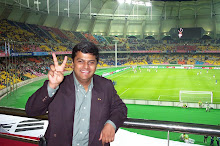There used to be a time as a young boy, I wanted to be part of them. These people defined the public opinion-making in India through their columns, lectures, interviews controlled by very few. They were the English speaking as well as senior vernacular Intelligentsia. They were part and parcel of every prestigious event staring from school-level gatherings, to prestigious cultural events. They received various awards from Gulley to Delhi. They defined public morality and consciousness. They claimed the empathy of the masses and championed causes of the downtrodden as they were well entrenched in their ivory towers and worldly comforts. They had access to the ruling class and policy-making. Then there was liberalization. Access to better lives was democratized. Eventually, there was the internet, and opinion-making was also democratized. So this group went into oblivion and turned obsolete. Now this group is trying to remain relevant by selecting soft targets. They still remain in Utopia remaining silent of real perils for the society as well justifying the evil deeds. They ignore basic laws of data analytics to equate small outlier events as commonplace occurrences creating fear psychosis within the masses. Having seen this transformation for the last three decades, I no longer want to be a part of them.
I encountered one of the Utopians after I wrote a piece analyzing heroic deeds of Kargil heroes. Towards the conclusion of this article, I shared my feeling of being unworthy of the sacrifices of these young people. The first objection was to the futility of war and why as a society we kind of celebrate war and glorify its outcomes like a sacrifice. Also, there was a dragged-in comment amount about how if we coexist and believe in something called secularism we won’t need wars. Also, there was complaining that ‘new’ India has lost these values. Utopians believe that so long as it doesn’t affect their own immediate self and those nearby all the worldly problems can be solved by idealism. But in the real world, there are conflicts. Though no one likes war or its outcome but they happen. And someone has to take upon the tasks to defend or maintain law and order. Just like someone has to enter the drainage to clean it. And we should be thankful for our armed forces, Covid workers, sanitation workers and Police. But then these are soft targets.
Now that you must have realized the category of people I am referring to, another important attribute of these Utopians is to remain silent on issues conveniently or ignore the elephant in the room or even justifying the certain wrongdoings suitable to the causes they champion.
Do we remember the hue and cry they created when delta variant ravaged India? We were caught unprepared, and due to the sheer numbers, our system was overwhelmed. Now the whole world is suffering and there is complete silence. Some of the people justified post-election violence in Bengal with something as insensitive as the winner’s prerogative. Utopians were singing paeans about Kerala Government for Covid control and oxygen supply but when numbers started going haywire what do we get complete silence.
Recently we saw the silence of Utopians on seizure of Afghanistan by the extremist elements. But then denouncing them would be dangerous. These elements hardly believe in freedom of expression. Now they don’t cry about feminism. But then they denounce every Indian tradition to be anti-feminist and patriarchal as they are soft targets. In fact, some of them even try to justify the Taliban with something as ludicrous as Taliban at least hold press conferences. They want the Taliban to be given second chance. They justify their extremism as a counter to US policies. Some Utopians are comparing them to Indian traditionalists. They know they can do that as they are the soft targets.
Utopians blame India’s stance on various matters ranging from Farm Laws, Kashmir, Economic Policies, Judicial reforms, laws approved democratically. The only and only reason for that is the inbuilt democratic nature of ‘Indian culture’. Please note secular values, constitutional beliefs are just jargon. But underlying religious traditions of coexistence make democracy and freedom and expression possible in India. But this has rendered whatever is considered to be called Indian as a soft target. Thus they can speak out against anything under the sun against the state, culture, and religious traditions.
Now I know here there will be swords drawn equipped with skew data analytics quoting sedition laws being used, the plight of so-called urban Naxalites, regulation of NGOs, journalists under attacks from states and so on. But you cannot ignore a great underlying number of cases where people have expressed way they wanted to in a safe manner as compared to incidences which are blown out of proportion by the Intelligentsia.
Here in the USA, Utopians have found their soft target in Global Hindutva. They questionably claim to have support from 41 universities as an entity for what they call it a Global online conclave titled Dismantling Hindutva. There they are trying to explain to people who have no affiliations to know the so-called perils of Hindutva. Hindutva is now widely accepted as the ‘Indian way of life’ as compared to a religious identity. This is accepted even by the courts of India. Indian Culture believes in coexistence. Live and let live has been our ethos. We know the demographics and as a widely multi-religious society as ours we have to do be inclusive in our lives. There have been assertions of aspirational India which has reflected positively in all walks of Life. Let this assertion be not branded as aggression or jingoism as maligned by these Utopians who seem to have missed the bus and lost favors with governance. But again Utopians know their soft targets as they are trying to influence the mind space of second-generation Indians across universities and those who don’t have any initiation. These activities should be countered ideologically and counterpoints have to be put in democratically.


